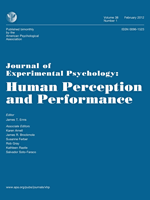Journals have retracted three out of the four papers flagged by the Office of Research Integrity during its investigation of a University of Oregon neuroscience student, David Anderson.
Last month, when we first reported on the case, Anderson told us that he “made an error in judgment,” and took “full responsibility.” Two of the retraction notes say that Anderson “knowingly falsified data,” and cited the Office of Research Integrity case summary.
All three papers focus on memory.
The note for the first retraction, from the Journal of Experimental Psychology: Human Perception and Performance, reveals exactly how Anderson falsified data in the paper. It’s paywalled — tsk, tsk — but printed here in full:
The following article from the June 2013 issue is being retracted: Anderson, D. E., Vogel, E. K., & Awh, E. (2013). Selection and storage of perceptual groups is constrained by a discrete resource in working memory. Journal of Experimental Psychology: Human Perception and Performance, 39, 824 – 835. http://dx.doi.org/10.1037/a0030094.
The retraction is at the request of the authors. As determined by the Office of Research Integrity (https://ori.hhs.gov/content/case-summary-anderson-david), and based on an assessment conducted by the University of Oregon, Eugene, coauthor David E. Anderson, by his own admission, knowingly falsified data by removing outlier values or replacing outliers with mean values in Figures 3C, 3D, and 3E to produce results that conformed to predictions. Within hours of learning about potential problems with the research from Anderson himself, corresponding author Edward Awh alerted the University of Oregon about the need to conduct an inquiry, and subsequently cooperated fully in the institutional investigation and honored confidentiality requests during the internal process and pending the announcement by the Office of Research Integrity. Unfortunately, the fabrication of data was not identified in time to prevent the manuscript with the erroneous analyses from being published.
All authors of the original article joined in the request for the retraction.
The paper has been cited 12 times, according to Thomson Scientific’s Web of Knowledge.
Here’s the note for the second retraction, a paper published in Attention, Perception, & Psychophysics, called “The plateau in mnemonic resolution across large set sizes indicates discrete resource limits in visual working memory:”
This article has been retracted at the request of the second author following an admission by the lead author, Mr. David E. Anderson, that he knowingly falsified data. Specifically, outlier values were removed or replaced with mean values in Figures 3b, 7c, 7d and 8b to produce results that conformed to predictions. An analysis by the Office of Research Integrity, in the US Department of Health and Human Services, (https://ori.hhs.gov/content/case-summary-anderson-david-0) found that the first author knowingly engaged in research misconduct, and this individual has taken sole responsibility for his actions. In light of these findings, the editor and publisher of Attention, Perception, & Psychophysics fully retract the article from the published record.
The paper has been cited 20 times.
The third note is slightly more sparse:
At the request of the authors, The Journal of Neuroscience is retracting “Precision in Visual Working Memory Reaches a Stable Plateau When Individual Item Limits Are Exceeded” by David E. Anderson, Edward K. Vogel, and Edward Awh, which appeared on pages 1128–1138 of the January 19, 2011 issue.
The paper has been cited 88 times.
This makes four total retractions for Anderson and his former supervisor, Edward Awh, now at the University of Chicago. Separate from the misconduct, Anderson and Awh have had to pull another Journal of Neuroscience paper due to“an error in the analytic code.”
There’s one more retraction to come. Awh told us last month that he had requested retractions on all four of the fraudulent papers, and indeed the Psychological Science editor in chief Steve Lindsay told us:
Retraction should be out very soon.
We also emailed Anderson and asked about his status as a grad student at the university. We will update this post if we hear back.
Hat tip: Rolf Degen and Kerry Grens
Like Retraction Watch? Consider supporting our growth. You can also follow us on Twitter, like us on Facebook, add us to your RSS reader, and sign up on our homepage for an email every time there’s a new post. Click here to review our Comments Policy.
